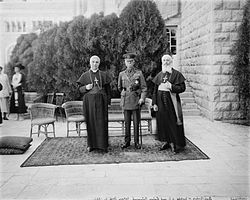Letter from ‘Maraat-al-Sherk’ to Lord Plumer, Aug. 25, 1925.
 ‘Maraat-al-Sherk’ addressed a formal letter to H. E. Field Marshal Lord Plumer, High Commissioner for Palestine- opening with the salutation-
‘Maraat-al-Sherk’ addressed a formal letter to H. E. Field Marshal Lord Plumer, High Commissioner for Palestine- opening with the salutation-
“Allow us to offer you our warmest welcome to Palestine as High Commissioner. We venture to express this welcome on behalf of those Arabs of Palestine – and we believe them to be the majority of the population – who gratefully acknowledge the benefits to be derived under the fostering care of a British Mandate, and who earnestly desire for our Arab leaders that education and experience which can (we believe) best be acquired under the guidance of, and in hearty and open cooperation with, trained and tried British officials.”
Then follows a long accusation against the previous British administration, and an appeal for participation in the legislative affairs of the country-
“We would also, Your Excellency, in the name of the Arabs of Palestine – and again, we believe they are a majority of the population – who have long deplored the system which has obtained during the last two years. . . of Arab non-cooperation in the legislative affairs of the country. We do not propose to touch on the rights or wrongs of this past Arab policy, beyond expressing a hope that this policy is, or soon will be a thing of the past. The Palestine Arabs, despite their inexperience in organizations and united action, have yet, more than once, shown clearly that they long for an enlightened leadership which shall state their wishes, and explain the hardships under which they labor, in a fashion that would prove to His Majesty’s Government that the Arabs of Palestine are not moved solely by a vain and childish obstructiveness, or by a purely negative spirit of opposition to the present policy of the Mandatory Power. The past five years have not been without their effect. We would not have the British public (of whose interest in the people of the Holy Land we are gratefully aware) – we would not have them withdraw their sympathy from us in the belief that we ‘have forgotten nothing and learned nothing.’ We have learnt much- we will readily forget much.”
There is a plea for the solution of the ‘Arab problem’-
“We wish the date of Your Excellency’s arrival in our country, August the Twenty-fifth, 1925, to mark a landmark in the so-called ‘Arab problem’ of Palestine. From this day we wish our attitude towards the officials of the Mandatory Power to be openly recognized and known as one that cheerfully discards grievances and habits acquired in past years, that cleanses from our minds all bitterness aroused by real or supposed injustice or misjudgment of the past.”
Methods of dealing with the problem are vaguely described-
“We realize that we are in no position to bargain with His Majesty’s Government on what terms to ‘offer our cooperation’- nor are we blind to the fact that it is inconsonant with His Majesty’s dignity to enter into a bargain with (as you think) an ill-developed, ill-educated, unorganized, inexperienced and disunited and comparatively small population. But we appeal for some, at least, of the benefits intended, to accrue to a mandated area – education in self-government. Admitted that we are as yet too politically immature wholly to steer Palestine through the shoals from destitution to prosperity, we yet permit ourselves to persist in claiming a right to sit by the side of the experienced pilot, and even from time to time make our own comments and suggestions as to the course pursued and the ultimate goal proposed.”
The Arab opposition to the Mandate is vigorously set forth-
“We make no pretence of reconciling our Arab consciences with the whole terms and purport of the Mandate. We see in Palestine an Arab land and a centre where, by virtue of long centuries of history and in the interests of the very great majority in the country, Arab civilization has every prior claim to consideration and the right to demur most vigorously to whatever threatens to submerge that civilization. But, for good or for ill, as a brief expedient or lengthy experiment, we are forced to admit the condition of things sanctioned by powers beyond our control. Thus much being said, we leave that question for the future – when our fears have been justified or found baseless, or when the League of Nations sees fit to reexamine the position from the Arab standpoint.”
Two definite suggestions are made-
(a) “that you will as a first call on your powers, use all your knowledge of men and affairs, and the advice of your officials in ascertaining the truth of our assertion that the bulk of the Arab population of all grades is anxious to cooperate with the Government, and so far as its poor ability permits, advise in the conduct of Arab affairs that, .
(b) as you gradually make acquaintance with the more thoughtful and influential among the Arabs, you endeavor to recommend to His Majesty’s Government such measures of modification in the ‘Order in Council’ which now decrees the nature of the Constitution of Palestine, as shall render possible the free and hearty measure of cooperation in the country’s government and legislation to which all sections of the population admittedly are entitled.”
The letter closes with a touching benediction-
“May God bless your period of office in this country, make you beloved by all our people, and grant you health and strength to pursue your difficult work and may your name be written as a blessing in the annals of this our Holy Land.”
Source- Andrews, Fannie Fern. The Holy Land Under Mandate. The Riverside Press. Cambridge, Massachussets, 1931. pp. 224-226.



